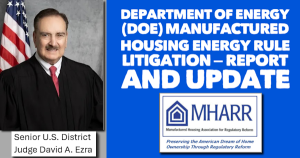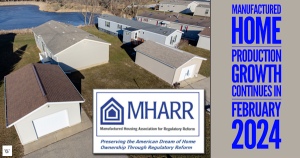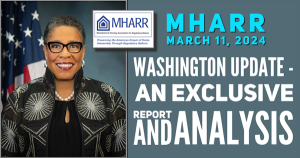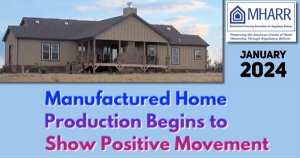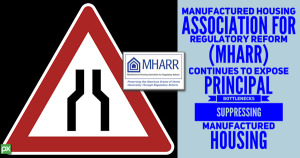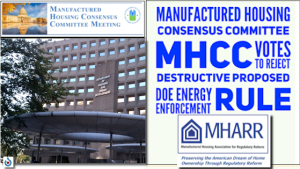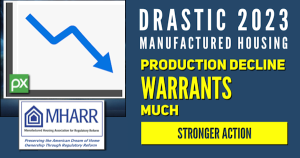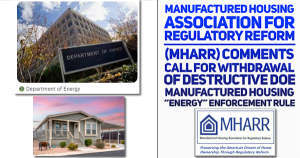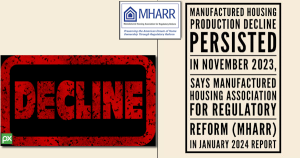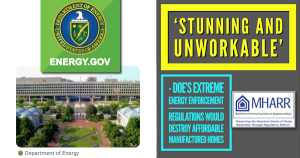Twenty-Year MHARR Effort to Increase State Funding Takes Another Step Forward
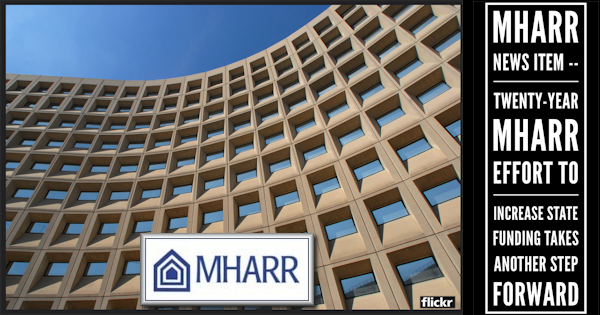
Washington, D.C., January 12, 2021 – The Manufactured Housing Association for Regulatory Reform (MHARR), in comments filed with the U.S. Department of Housing and Urban Development (HUD) copy attached on January 11, 2021, has called on the HUD Office of Manufactured Housing Programs (OMHP) to significantly increase funding for State Administrative Agencies (SAAs) that partner with HUD in carrying out various functions authorized by the National Manufactured Housing Construction and Safety Standards Act of 1974, as amended by the Manufactured Housing Improvement Act of 2000. An increase in HUD program payments to state partners, and a corresponding reduction in HUD payments to – and dependence upon – private contractors, has been a longstanding MHARR goal and was the basis for MHARR’s insistence on language in the 2000 reform law designed to both support state participation and state funding, and simultaneously restrict functions that could be delegated to revenue-driven contractors.
MHARR’s comments, which respond to a long-overdue Advance Notice of Proposed Rulemaking (ANPR) issued by HUD on November 12, 2020, emphasize the fundamental importance of the federal-state partnership underlying the federal manufactured housing program (one of the most important elements of the 1974 Act), and the urgent need to properly fund that partnership as illustrated by the recent withdrawal of certain key states – either from the program entirely, or from specific program functions. MHARR’s comments thus seek not only to strengthen existing state participation, but also to encourage new SAAs to be established and to enter the program.
As MHARR stresses, enhanced state funding – and a corresponding reduction in unnecessarily-bloated funding for program contractors – is absolutely necessary insofar as state SAAs are responsible for consumer protection with respect to an ever-growing number of manufactured homes produced since the inception of federal regulation in 1976, while contractors today are responsible for monitoring a much smaller number of current-production homes. Indeed, while state SAA funding has declined by more than 45% since 2005, program contractor funding has increased by more than 167% over the same period, even though only 94,615 homes were produced in 2019, as compared with 146,881 in 2005.
Given the fact that SAAs, as state agencies, have constituencies and a degree of legitimacy that contractors do not have, and were specifically intended by Congress to be part of the regulatory structure of the federal manufactured housing program, SAA participation – and corresponding funding equity – should be an overriding priority for HUD and for OMHP. Accordingly, MHARR’s comments call on HUD to maintain the minimum SAA funding levels required by the 2000 reform law and to further increase SAA funding over and above that statutory floor, to include payments for the performance of specific program functions based on accurate state-by-state information and calculations.
While this proceeding is finally addressing a long-delayed and long-overdue priority, MHARR will continue to press, as it has for the past twenty years, for the full implementation of the 2000 reform law’s provisions regarding proper SAA funding and corresponding limitations on and reductions of contractor activities and funding.
The Manufactured Housing Association for Regulatory Reform is a Washington, D.C.-based national trade association representing the views and interests of independent producers of federally-regulated manufactured housing.

Washington, D.C., January 12, 2021 – The Manufactured Housing Association for Regulatory Reform (MHARR), in comments filed with the U.S. Department of Housing and Urban Development (HUD) copy attached on January 11, 2021, has called on the HUD Office of Manufactured Housing Programs (OMHP) to significantly increase funding for State Administrative Agencies (SAAs) that partner with HUD in carrying out various functions authorized by the National Manufactured Housing Construction and Safety Standards Act of 1974, as amended by the Manufactured Housing Improvement Act of 2000. An increase in HUD program payments to state partners, and a corresponding reduction in HUD payments to – and dependence upon – private contractors, has been a longstanding MHARR goal and was the basis for MHARR’s insistence on language in the 2000 reform law designed to both support state participation and state funding, and simultaneously restrict functions that could be delegated to revenue-driven contractors.
MHARR’s comments, which respond to a long-overdue Advance Notice of Proposed Rulemaking (ANPR) issued by HUD on November 12, 2020, emphasize the fundamental importance of the federal-state partnership underlying the federal manufactured housing program (one of the most important elements of the 1974 Act), and the urgent need to properly fund that partnership as illustrated by the recent withdrawal of certain key states – either from the program entirely, or from specific program functions. MHARR’s comments thus seek not only to strengthen existing state participation, but also to encourage new SAAs to be established and to enter the program.
As MHARR stresses, enhanced state funding – and a corresponding reduction in unnecessarily-bloated funding for program contractors – is absolutely necessary insofar as state SAAs are responsible for consumer protection with respect to an ever-growing number of manufactured homes produced since the inception of federal regulation in 1976, while contractors today are responsible for monitoring a much smaller number of current-production homes. Indeed, while state SAA funding has declined by more than 45% since 2005, program contractor funding has increased by more than 167% over the same period, even though only 94,615 homes were produced in 2019, as compared with 146,881 in 2005.
Given the fact that SAAs, as state agencies, have constituencies and a degree of legitimacy that contractors do not have, and were specifically intended by Congress to be part of the regulatory structure of the federal manufactured housing program, SAA participation – and corresponding funding equity – should be an overriding priority for HUD and for OMHP. Accordingly, MHARR’s comments call on HUD to maintain the minimum SAA funding levels required by the 2000 reform law and to further increase SAA funding over and above that statutory floor, to include payments for the performance of specific program functions based on accurate state-by-state information and calculations.
While this proceeding is finally addressing a long-delayed and long-overdue priority, MHARR will continue to press, as it has for the past twenty years, for the full implementation of the 2000 reform law’s provisions regarding proper SAA funding and corresponding limitations on and reductions of contractor activities and funding.
The Manufactured Housing Association for Regulatory Reform is a Washington, D.C.-based national trade association representing the views and interests of independent producers of federally-regulated manufactured housing.


